
Year in Review 2006–07: Part 2
October 2006
UW–Madison adopts a multiyear plan to reform its use of limited-term employees (LTEs), following a proposal from an advisory body composed of students, staff and LTEs. The group's plan includes designations for seasonal and irregular functions, converting current inappropriate LTE appointments and ensuring that the positions pay at least the “living wage.” The campus has approximately 2,500 LTE appointments.
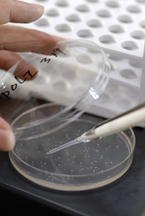
UW researchers study ways to protect against influenza viruses.
Opening a new front in the war against flu, UW–Madison researchers report the discovery of a peptide — a small protein molecule — that confers broad protection against influenza viruses, including deadly avian influenza. The new finding is important because it could make available a class of new antiviral drugs to prevent and treat influenza at a time when fear of a global pandemic is heightened and available antiviral drugs are losing their potency.
The U.S. Department of Education awards the university's Language Institute and the National Council of Less Commonly Taught Languages a three-year grant to launch a project aimed at improving instruction in less commonly taught languages, defined as all world languages other than English, French, German, Italian or Spanish, by providing better teacher training. Promoting proficiency in diverse world languages and cultures has become a national priority in the increasingly interconnected world of the 21st century.
The university scores a major in-state recruiting coup by attracting the state’s largest number of 2006 Wisconsin All-State Scholars, a scholarship program that honors the state's top high school seniors. Of the program's 120 awardees, 44 elected to enroll at UW–Madison.
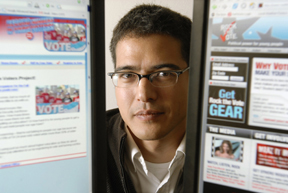
Michael Xenos studies early use of the Web for election communications.
A UW–Madison researcher shares findings of a study examining Web practices used in the 2002 and 2004 elections. Working with collaborators from around the country, Michael Xenos, a communication arts professor, finds that the vast majority of practices fell into a traditional category by offering issue positions, providing campaign updates and volunteer sign-up options, and allowing online donations. Few campaign practices, the study found, were uniquely styled for the Web.
UW–Madison and Google agree to expand access to public and historical books and documents from the more than 7.2 million holdings at the UW–Madison Libraries and the Wisconsin Historical Society Library. The university becomes the eighth library to join Google’s ambitious effort to digitize the world's books and make them searchable on Google Book Search. The combined library collections of UW–Madison and the Wisconsin Historical Society constitute one of the largest collections of documents and historical materials to be found in the United States.
In its latest biennial ranking of MBA programs, BusinessWeek rates the Wisconsin MBA program No. 4 in the nation in terms of fastest return on students' investment. According to the magazine's findings, students who earn MBAs from UW–Madison have their costs of going back to school repaid due to higher salaries in less than five years, compared to more than 15 years for other programs.
The Offices of the Dean of Students (ODOS) undertake a long-term effort to bring together academic programs, faculty and student life sides of the university — creating a unique “Wisconsin Experience” not offered elsewhere. Although ODOS will continue to provide resources designed to promote student success, manage discipline or help students deal with crisis situations, staff also will champion the broader goal of helping students realize the Wisconsin Idea.
Michael Carter, an agricultural and applied economics professor, will oversee a new $10 million federal program that will support a wide range of projects aimed at understanding and curbing poverty in developing nations. The project, the Assets and Market Access Collaborative Research Support Program, represents a major effort by the U.S. Agency for International Development to address this serious global issue. The five-year research effort pairs American scientists with researchers in developing nations to study and help tackle barriers faced by the world’s poorest individuals.
November 2006
Access is the university’s No. 1 challenge, Chancellor John D. Wiley tells the university’s Faculty Senate. The key to providing access, he says, is to encourage more students who are starting their college careers to explore alternatives, including UW–Madison’s Connections Program or another transfer program. Connections allows Wisconsin residents to start at two-year college campuses and finish their bachelor’s degrees at UW–Madison, while holding UW–Madison student status from the beginning of their academic careers.
The university’s Institute for Research on Poverty, the nation’s first poverty research center, celebrates its 40th year. Founded as part of President Lyndon B. Johnson’s War on Poverty, the institute is nationally recognized for training scholars, often across a range of disciplines, in the implications of poverty and in developing methods to analyze and fight it.
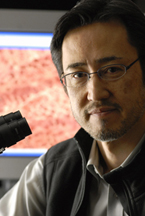
Yoshihiro Kawaoka releases findings about the avian flu virus.
New work lead by Yoshihiro Kawaoka, a virologist in the School of Veterinary Medicine, provides a molecular blueprint for the genetic changes required to transform the H5N1 avian influenza virus to one that is capable of easily recognizing human receptors. By knowing what genetic changes are required for the virus to easily infect human cells, it may be possible to detect the emergence of pandemic strains earlier, providing public health officials and vaccine manufacturers with precious time to prepare for a global outbreak of highly pathogenic influenza.
International Reach, a service of International Student Services, schedules visits by foreign students to campus classrooms, local schools and community organizations, providing a more personal and realistic view of different cultures around the world. More than 65 international students from 20-plus countries regularly participate in the program, giving presentations about their cultures and countries, and discussing topics such as globalization or global warming.
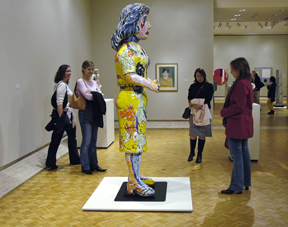
A campaign is launched to raise funds to expand the Chazen Museum of Art.
The Chazen Museum of Art kicks off “Something for Everyone,” a communitywide capital campaign to raise the remaining $10 million for its planned 62,000-square-foot addition. In May 2005, the museum — a vibrant center for visual art — received a gift of $20 million from UW–Madison alumni Simona and Jerome Chazen. The entire cost of the building project will be met through gifts and grants from private sources.
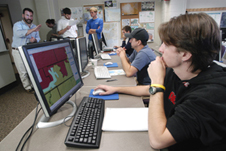
Geography students tackle the creation of an information-rich campus map.
A group of UW–Madison students, led by geography professor Mark Harrower, create a new interactive campus map that is accessible via the university’s home page. Featuring an intelligent search interface, the map allows users to highlight a route to a building, find where a certain department is located, see which buses pass by a bus stop and more.
December 2006
Aaron Brower, a professor of social work and integrated liberal studies, is named vice provost for teaching and learning, a position in which he will work to expand opportunities for student engagement in areas such as service learning, undergraduate research, learning communities and honors programs.
E. David Cronon, 82, an influential and revered former dean of the College of Letters and Sciences and history professor for more than four decades, passes away. Cronon, who led the university’s largest college from 1974–1988, is widely credited with developing and strengthening many L&S programs, including Afro-American studies, women’s studies, anthropology, computer sciences and Slavic languages.
The Economist Intelligence Unit ranks open-enrollment executive education programs at the School of Business the best in the world for the second consecutive year. Most of UW–Madison’s more than 240 executive education programs are held at the Fluno Center, which received the highest worldwide rating for food and accommodations for three consecutive years by the Financial Times.
Ben Karlin, a UW–Madison alumnus and executive producer of Comedy Central’s “The Daily Show,” speaks to graduating students at the winter commencement ceremonies. Karlin, who began his professional career in 1993 as editor of and writer for The Onion, in 2005 was named a recipient of the Wisconsin Alumni Association’s Distinguished Alumni Award.
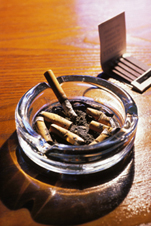
A study identifies modest cost of national quitlines.
An analysis conducted by the UW School of Medicine and Public Health finds that tobacco cessation treatment provided by 38 quitlines in the United States carries a remarkably modest cost — a median per capita cost of 14 cents and a median cost per adult smoker of 85 cents. The Centers for Disease Control estimates the total economic cost of smoking to be $3,931 per year, per smoker. Tobacco quitlines provide a variety of services, including distributing self-help materials, proactive counseling and referral to other services.